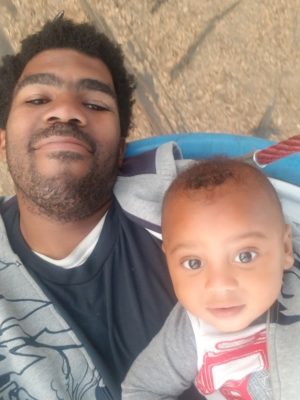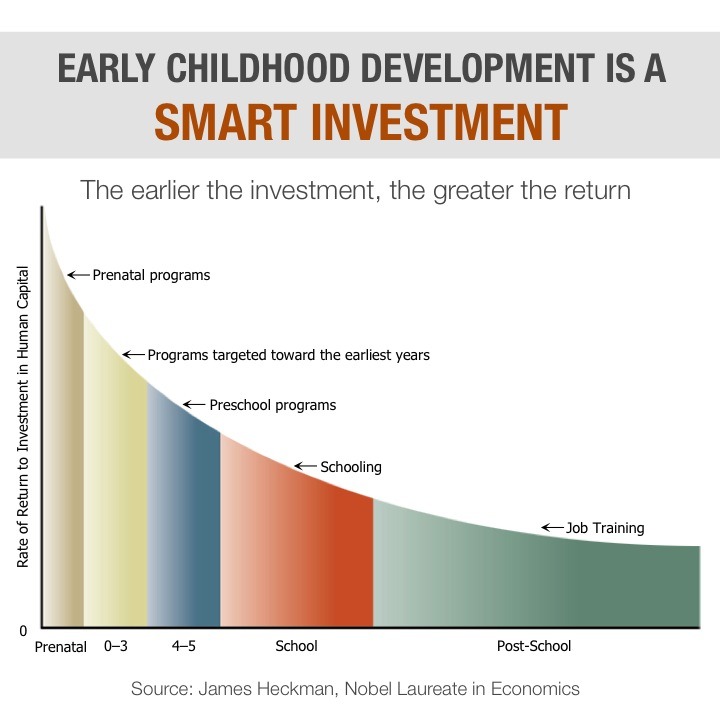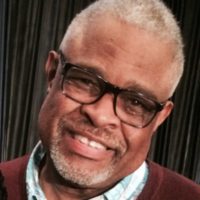A Kidango Father, A Nobel Laureate, and Pre-K for All
By Peggy Daly Pizzo, M.Ed, Ed.M and Ed Greene, PhD.
June 16, 2019
What might world-renowned Nobel Laureate economist James Heckman, seated at his desk at the University of Chicago—and Robert Coil, a father who, with his wife, is raising three young children in the low-income Castlemont neighborhood of Oakland—have in common?
At least two things. First, they both recognize the importance of parents, including fathers, in shaping the positive educational and life outcomes of children. And second, they both agree that high-quality preschool, Head Start and Early Head Start support and intensify the positive influence of parents on their children’s health and development.
Robert works nights at the airport. During the day, when he hasn’t picked up an extra shift at his job, he takes his five-year-old son, a graduate of Kidango’s early learning program, to kindergarten—and his three-year-old son to an Early Head Start/Head Start center operated by Kidango in the Castlemont neighborhood of Oakland.

Frequently, after catching up on sleep, Robert volunteers at the Kidango Castlemont center. He’s also proud to be a member of the Head Start policy council. And he travels to Sacramento with other Kidango parents and educators to advocate for the highest possible quality in child care and preschool for all children. Robert also speaks out for the expansion of Early Head Start-like child care, so that he and his wife will be better able to support their one-year-old son’s readiness for a great PreK experience and later school and life success. We highlighted Robert in a recent video on advocacy.
Nobel Laureate Heckman, a profoundly respected economist, has recently alerted the early care and education (ECE) field to new evidence emerging about the impact of a famous, high quality, rigorously evaluated program called the Perry Preschool Project. The Perry Preschool served African-American children in Michigan—and has long been looked to as a model for effective early care and education.
The new evidence? High-quality preschool significantly contributed to the development of African-American boys who grew up to be fathers like Robert. How? By supporting the original parents of the children who participated in the Perry Preschool Project, as well as the children.
For decades, Heckman has investigated the impact of early care and education (ECE) programs. He has delved deep into thousands of detailed pages of research documents, examining the evidence emergent from many studies.
He confirmed earlier findings of a benefit of $7 for every $1 invested for quality preschool for low-income children—and a benefit of $13 for every $1 invested when high-quality infant toddler care is offered.
Two fact sheets prepared by Peggy Pizzo for Kidango summarize the data about quality infant toddler child care: Benefits of High-Quality, Evidence-Based Child Care-Early Head Start Partnerships and The Evidence Base for Child Care-Early Head Start Partnerships.
The world-famous Heckman Curve illustrates the benefits of starting prenatally or at birth.

In 2019, Professor Heckman returned to a deep analysis of the Perry Preschool. He and his colleagues examined data about the now adult children of the Perry graduates, the grandchildren of the original Perry parents, as they moved through adolescence into adulthood.
Remarkable findings emerged: five decades later, the adult offspring of the original Perry participants benefited, compared to the adult offspring of those original children who had not been randomized to participation in Perry.
Heckman and colleagues state that the children of Perry graduates:
“…were less likely to be suspended from school, and more likely to complete regular or any other form of high school and to be employed full-time with some college experience. While present for both male and female children of participants, the wide range of beneficial effects are particularly strong for the male children of participants, especially those of male participants.”
Why? Perry Preschool teachers and staff engaged the parents of the participating boys and girls in addition to high quality early learning experiences in the classroom. Weekly home visits and other activities helped them become stronger, more effective parents. And together, the teachers and the parents promoted the social-emotional as well as the cognitive skills so needed for the attainment of a rich, stable family life.
Are California leaders listening? Led by an obviously caring father, Governor Newsom, and by committed Assembly and Senate leaders, are our state’s elected officials responding?
Are these leaders aware that they can positively influence the parents, the children and the grandchildren in the families participating in the California State Preschool program, IF they also improve the effectiveness of California’s signature pre-K program?
The moment arrives. A dedicated father sits at the Governor’s Desk in the State House. Equally committed mothers and fathers leading the state legislature have toiled long hours to bring the state to this point of readiness for better quality. We are at the brink of historic policy advances that can transform the futures of our children and inspire other states to do the same.
On this Father’s Day, we hope all of us remember those original boys in the Perry Preschool Project, who, supported early in life by family-centered preschool, managed to grow up to be good fathers, in the face of the bitter racism that confronts boys and men of color.
We urge our policymakers to remember all the Roberts of California: low-income African-American, Latino, Asian, Euro-American, Indian, Pacific Islander and Native American men who want to support their wives as equal partners. Fathers who want their children—girls and boys– to have a quality preschool education and start walking the path out of poverty into a better future.
Invest in these children—and their parents.
*****************************
Peggy Daly Pizzo is the Director of the Early Learning Project at the Stanford Graduate School of Education. While serving on the White House staff, she helped to publicize the first long-term findings of the Perry Preschool Project.
Ed Greene is the Vice President, Children, Youth and Digital Media Literacy Outreach of the Hispanic Information and Telecommunications Network (HITN). He has served on the Board of Directors for NAEYC and for the High Scope Research Foundation, which supports national and international research about effective early care and education programs, including the Perry Preschool Project.
Ms. Pizzo and Dr. Greene are both members of the Board of Directors of Kidango.











